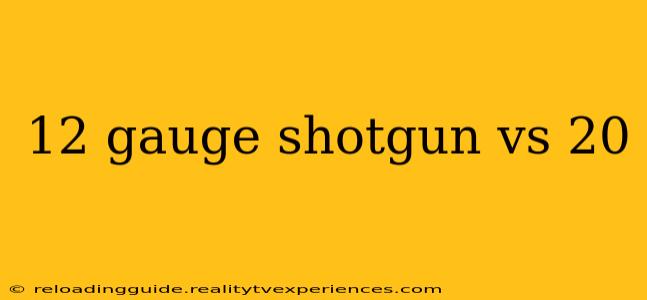Choosing between a 12 gauge and a 20 gauge shotgun is a common dilemma for both novice and experienced shooters. The best choice depends heavily on your intended use, physical capabilities, and personal preferences. This in-depth comparison will help you understand the key differences and decide which gauge is right for you.
Key Differences: Gauge, Recoil, and Power
The most significant difference lies in the gauge, which refers to the diameter of the barrel. A 12 gauge shotgun has a larger diameter barrel than a 20 gauge. This seemingly small difference has significant implications for:
- Power: The 12 gauge delivers significantly more power, meaning a harder-hitting shot with greater range and stopping power. This makes it ideal for hunting larger game.
- Recoil: The greater power of the 12 gauge also translates to stronger recoil. This can be uncomfortable, even painful, for smaller or less experienced shooters. The 20 gauge offers a much softer recoil, making it more manageable and enjoyable for extended shooting sessions.
- Shot Pattern: While both gauges can produce effective shot patterns, the 12 gauge generally throws a wider pattern, especially at longer ranges. This can be advantageous for hunting but may be less precise for target shooting.
12 Gauge Shotgun: The Heavyweight Champion
The 12 gauge reigns supreme in popularity and versatility. Its hard-hitting power makes it a preferred choice for:
- Hunting Large Game: Deer, turkey, waterfowl (with appropriate shot), and even bear hunting are all within the capabilities of a 12 gauge. Its stopping power is unmatched by the 20 gauge in these scenarios.
- Home Defense: The raw power and availability of ammunition make it a formidable home defense option.
- Clay Shooting: While the recoil can be a factor, skilled shooters can effectively utilize a 12 gauge for various clay shooting disciplines.
Advantages of a 12 Gauge:
- Greater Power and Range: Superior stopping power and effective range.
- Wider Shot Pattern: Offers a larger spread, beneficial for hunting.
- Ammunition Availability: Extremely widespread availability and a wide variety of ammunition types.
Disadvantages of a 12 Gauge:
- Strong Recoil: Can be punishing for smaller or less experienced shooters.
- Heavier Weight: Generally heavier than a 20 gauge, leading to fatigue during prolonged use.
- More Expensive Ammunition (in some cases): Although prices fluctuate, certain types of 12 gauge ammo can be more costly than their 20 gauge counterparts.
20 Gauge Shotgun: The Lightweight Contender
The 20 gauge offers a compelling alternative for those seeking a more manageable and comfortable shooting experience without sacrificing too much power. It's excellent for:
- Hunting Smaller Game: Ideal for upland game birds, doves, rabbits, and squirrels. It's still sufficient for smaller deer with the right ammunition.
- Introduction to Shotgun Shooting: The gentler recoil makes it an excellent choice for beginners and young shooters.
- Target Shooting: The lighter recoil and more precise shot pattern at closer ranges make it well-suited for various target shooting disciplines.
Advantages of a 20 Gauge:
- Lighter Weight and Less Recoil: More comfortable to shoot, especially during extended sessions.
- Reduced Felt Recoil: Easier on the shoulder, promoting better accuracy and faster follow-up shots.
- More Manageable for Smaller Shooters: Ideal for women and youth shooters.
Disadvantages of a 20 Gauge:
- Less Power: Not as effective for hunting larger game or at longer ranges as a 12 gauge.
- Narrower Shot Pattern: May require more precise aim, especially at longer distances.
- Potentially Less Ammunition Availability in Certain Regions: Although widely available, the selection might be smaller than that of the 12 gauge in some areas.
Conclusion: The Right Gauge for You
Ultimately, the best gauge for you depends on your individual needs and priorities. Consider your intended use, physical capabilities, and budget when making your decision. If you need maximum power and are comfortable with stronger recoil, the 12 gauge is the clear winner. However, if recoil management, lighter weight, and comfort are paramount, the 20 gauge is an excellent option that still delivers effective performance for many applications. Many experienced shooters own both gauges, utilizing each for appropriate situations. Consider renting or borrowing both before making a final purchase decision to experience the differences firsthand.

